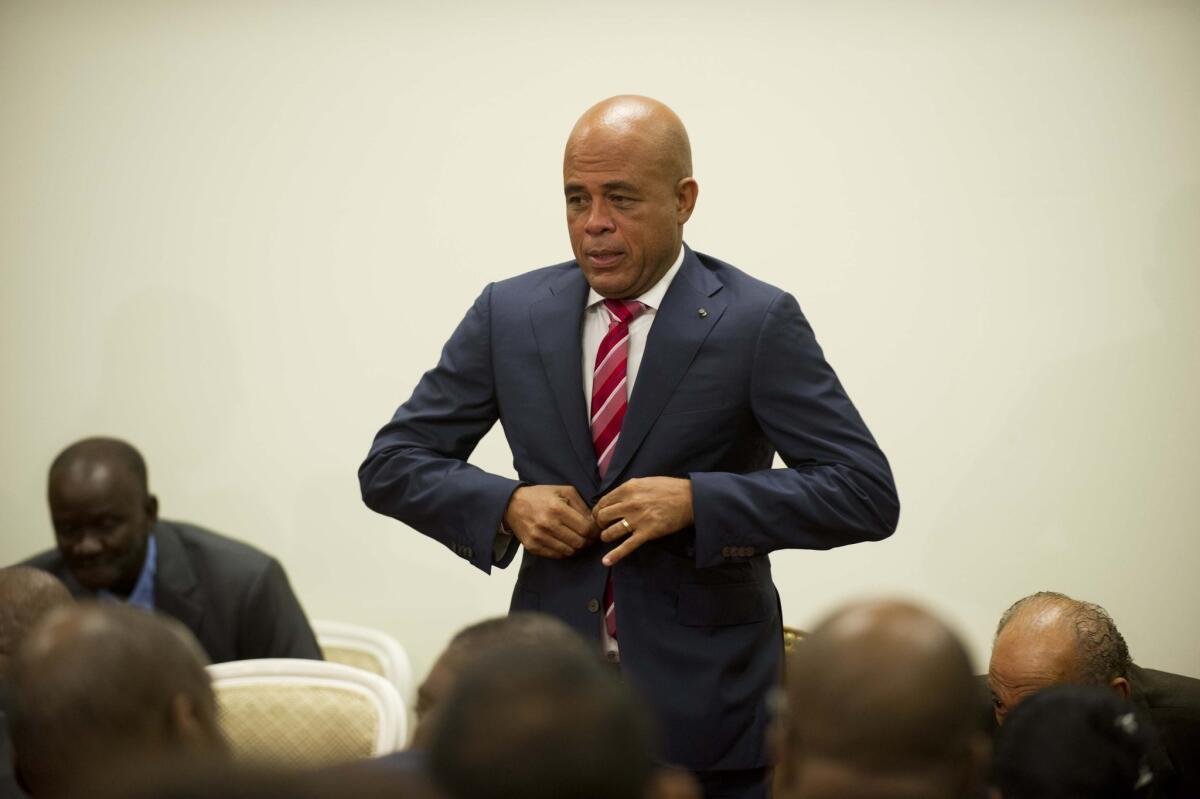Op-Ed: In Haiti, only the face of power has changed

- Share via
Almost five years since the devastating earthquake that rocked Haiti, the country remains adrift, and in recent weeks, even more than usual. In town after town, as well as in the capital, Port-au-Prince, large, angry crowds have gathered regularly to express their dissatisfaction with Haiti’s president, Michel Martelly. United Nations peacekeeping forces have fired on these crowds.
Confronted with the unrest, Martelly did what officials often do in such situations: He appointed a commission, stuffed with ancient politicians and apple-polishers, to recommend actions. In Haiti, not unlike other places, such commissions generally have one purpose: to advise officials to do exactly what they wanted to do all along. This time was no different. When the commission returned, it advised Martelly to jettison his prime minister, Laurent Lamothe, as well as the heads of the Supreme Court and the provisional electoral council, all people the president was already prepared to throw under the bus.
The prime minister is gone, though with no formal letter of resignation, and has reportedly been replaced by an interim figure. The other two officials will also presumably decamp, but that won’t solve Haiti’s larger crisis. If legislative elections are not held before Jan. 12, the legislature will be dissolved and Martelly will begin to rule by decree.
Francois “Papa Doc” Duvalier, the notorious and bloody-minded Haitian strongman, would almost certainly be amused to see Martelly, a former pop singer, going through such contortions to create a dictatorship. Papa Doc did things more simply and directly, but always with a wary eye on the U.S., which saw him as a bulwark against communism in the Caribbean, no matter how cruel his regime became, and never repudiated him.
Like Duvalier, Martelly seems less focused on improving the fortunes of his countrymen than he is on retaining power, at least to the end of his official term, something that has proved far more complicated than it was in the Duvalier days. Martelly’s Haiti is more transparent to the world than Papa Doc’s ever was, largely because of social media and Internet communications.
The United States is still meddling in Haiti’s business, still tugging on the strings of Haitian politics. Since Papa Doc’s son, the dictator John-Claude “Baby Doc” Duvalier, was almost ousted in 1986, with a big nudge from the U.S., Washington has been particularly concerned about elections in Haiti. For American officials, regular balloting, honest or not, has signified stability, a prerequisite for foreign investment — the prescription U.S. economic doctors always propose for poor countries.
But merely holding elections, especially corrupt ones from which the most popular party has recently been excluded, has done little to address Haiti’s problems. Since the end of the dictatorship in 1986, there have been abortive elections, monitored elections, several coups d’etat and even a couple of peaceful elections. Little has changed, however.
In the country’s most recent baroque election, Martelly emerged the victor, but his mandate has always been in question. Haunted by his own iffy “selection” — the word Haitians use for a manipulated election — Martelly soon came to a bickering impasse with the legislature that has led to the current crisis.
Meanwhile, for most Haitians, life remains desperate. The cost of living has risen sharply, and the majority live in dire poverty. The official unemployment rate is an astounding 39.5%, though most observers believe it is actually much higher.
Yet in this moment of crisis, Martelly has done little to change Haiti. His Twitter account in recent days shows photos of thousands of kids waiting near his residence to receive Christmas presents from him and the first lady, an old Duvalier Christmas tradition. As Roberson Alphonse wrote recently in Haiti’s main newspaper, “No one is going to claim that our leaders are among the geniuses of the hemisphere.”
Does Martelly deserve to remain in power? Probably not. His presidency has been a series of tragically missed opportunities to take back the reins of power for Haitian ideas for the Haitian people. The worst of his many failures was his wholly inadequate response to the continuing and urgent needs of his country in the aftermath of the earthquake’s devastation. He imitated the previous president, and left the biggest part of the job, rebuilding housing for more than 1 million displaced people, to the good graces of the international community — with less than spectacular results. More than 200,000 Haitians affected by the quake remain in displacement camps.
He also has failed to develop a comprehensive plan to jump-start Haiti’s economy. His main economic initiatives — old tattered ideas from the 1980s and before — were to open up his country to the international mining industry and to establish a huge industrial park anchored by a South Korean garment manufacturer. Both of these endeavors are based in the north, far from the population affected by the earthquake.
Given all this, it’s hard to imagine that those who took to the streets to demand an end to Martelly’s rule will be placated by the firing of a few officials. To gain any scrap of public confidence, he’ll have to show an investment in Haitians that goes deeper than the usual electoral carnival and the appointment of creaking commissions. No doubt that’s asking more than this president is capable of.
Amy Wilentz’s most recent book, “Farewell, Fred Voodoo: A Letter From Haiti,” won the 2013 National Book Critics Circle Award for autobiography.
Follow the Opinion section on Twitter @latimesopinion
More to Read
A cure for the common opinion
Get thought-provoking perspectives with our weekly newsletter.
You may occasionally receive promotional content from the Los Angeles Times.






